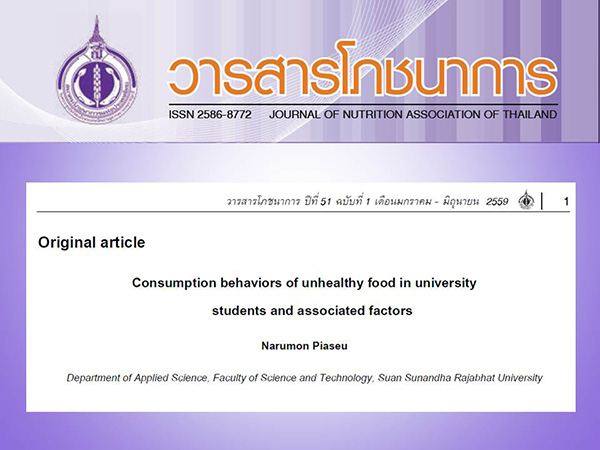Consumption behaviors of unhealthy food in university students and associated factors
Keywords:
Consumption behavior, Unhealthy food, University studentsAbstract
This study aimed to describe consumption behaviors of unhealthy food and associated factors among university students in Bangkok. Through stratified random sampling, sample included 400 undergraduate students. Data were collected by self-reported questionnaire. Data were then analyzed using frequency, percentage, means, standard deviation, independent t-test, and ANOVA. Results revealed that 67% of the sample were women; 74% enrolled in social related programs while 45.5% stayed in dormitory. The average monthly income was 5,164 Baht and daily food expenditure was 114.55 Baht. Majority of them (83%) had ready-to-eat food. A main reason for their food selection was food that looks good (70.75%). Approximately 43.5% had knowledge of unhealthy food at a fair level, while 39.25% had consumption behavior of unhealthy food. A major factor influencing their food selection was their parents (61%). Factors influencing consumption behaviors of unhealthy food were years in the program (F = 3.168, p = .024), daily food expenditure (F = 8.950, p < .001), and knowledge on unhealthy food (F = 37.856, p < .001). Results indicate the importance of providing knowledge on unhealthy food for students in order to promote appropriate food consumption behavior among them.
References
2. ทวีทอง หงส์วิวัฒน์. ต้านโรคด้วยอาหารการกิน. กรุงเทพมหานคร: บริษัทสำนักพิมพ์ แสงแดด จำกัด; 2551.
3. วันทนีย์ เกรียงสินยศ. โภชนาการกับเบาหวาน. กรุงเทพมหานคร: สำนักพิมพ์สารคดีในนามบริษัท วิริยะธุรกิจ จำกัด; 2551.
4. World Health Organization. Noncommunicable Disease (NCD) Country Profiles [Internet]. 2014 [cited 2015 Dec 1]. Available from https://www.who.int/nmh/countries/tha_en.pdf?ua=1.
5. Abbot JM, Byrd-Bredbenner C, Schaffner D, Bruhn CM, Blalock L. Comparison of food safety cognitions and self-reported food-handling behaviors with observed food safety behaviors of young adults. EJCN. 2009;63(4):572-9.
6. Bas M, Turker P, Koseler E, Saka M. Adolescents as a consumer: The food safety knowledge and practices. Journal of Society for development in new net environment. 2012;6(9):2973-82.
7. Haapalal, Probart C. Food safety knowledge, perceptions, and behaviors among middle school students. J Nutr Educ Behav. 2004;36(2):71-6.
8. Morrone M, Rathbun A. Health education and food safety behavior in the university setting. J Environ Health. 2003;65(7):9-15.
9. National Cancer Institute. Chemicals in meat cooked at high temperatures and cancer risk [Internet]. 2016 [cited 2016 Apr 14]. Available from: https://www.cancer.gov/about-cancer/causes-prevention/risk/diet/cooked-meats-fact-sheet.
10. Netrpraphai P. Survey of knowledge and food behaviors on potential carcinogen in secondary school students in Bangkok. [MS thesis]. Bangkok: Mahidol University; 2005.
11. Redmond EC, Griffith CJ. Consumer perceptions of food safety risk, control and responsibility. Appetite. 2004;43(3):309-13.
12. Krejcie RV, Morgan DW. Determining sample size for research activities. Educ Psychol Meas. 1970;30:607-10.
13. อัมพวัลย์ วิศวธีรานนท์. วิถีของคนไทยรุ่นใหม่: ศึกษากรณีพฤติกรรมการบริโภคอาหารของวัยรุ่น ในเขตกรุงเทพมหานคร. วารสารศิลปกรรมศาสตร์. 2543;8(2):69-83.
14. สุนีมาศ โนรี, เพ็ญจิต กาฬมณี. รายงานวิจัย: พฤติกรรมการบริโภคอาหารจานด่วนแบบไทยและแบบตะวันตกของนักศึกษาในจังหวัดเชียงใหม่. เชียงใหม่: คณะมนุษยศาสตร์ มหาวิทยาลัยเชียงใหม่; 2540.
15. จิราพร กันทะธง. พฤติกรรมการบริโภคอาหารของนักเรียนวัยรุ่นหญิงในอำเภอเมือง จังหวัดลำพูน [วิทยานิพนธ์ปริญญาวิทยาศาสตร์มหาบัณฑิต]. เชียงใหม่: มหาวิทยาลัยเชียงใหม่; 2544.
16. กัลยา ศรีมหันต์. การศึกษาภาวะโภชนาการและพฤติกรรมการบริโภคอาหารของเด็กวัยเรียนในเขตอำเภอเมือง จังหวัดราชบุรี [วิทยานิพนธ์ปริญญาพยาบาลศาสตร์มหาบัณฑิต]. กรุงเทพมหานคร: มหาวิทยาลัยมหิดล; 2541.
17. Piaseu N, Schepp K, Belza B. Causal analysis of exercise and calcium intake behaviors for osteoporosis prevention among young women in Thailand. Health Care Women Int. 2002;23(4):364-76.

Downloads
Published
How to Cite
Issue
Section
License
Upon acceptance of an article, copyright is belonging to the Nutrition Association of Thailand.


